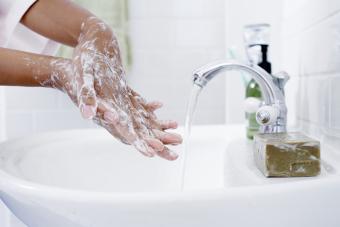
It should be an everyday practice to wash your hands regularly to prevent infection from spreading and keep yourself healthy. Washing your hands with soap and water, as simple as it sounds, is one of the most effective ways to prevent the spread of germs and bacteria.
Does Soap Kill Germs?
While soap sometimes is said to "kill" germs and bacteria on your hands and other surfaces, that's actually not correct. Germs are not actually "alive" and require a living host to replicate and spread. When you wash your hands with soap, the soap is effective because it disrupts the germ microbes' ability to stay on your skin.
How Soap Works
Soap is able to clean germs from your hands with a process that's too small to see by your eyes. Soap molecules get in between the oily surface of our skin and the germs and make it so that the germs stick to the soap molecules instead of the oil molecules. The soap molecules also bind with the water molecules and thus when you wash and rinse your hands, the germs get washed away with the soap and water.
Effective Hand Washing Technique
The most effective way to wash your hands, according to the Centers for Disease Control, is:
- Use water and soap, such as hand soap, bar soap, dishwashing liquid or anti-bacterial soap.
- The temperature of the water does not matter and using tepid or even cooler water can be beneficial if it causes you to wash your hands even longer.
- Wash for at least 20 seconds or about the time it takes to sign the traditional "Happy Birthday" song.
- For a more modern take on how long to clean your hands, you can use the popular Wash Your Lyrics app paired with your favorite song.
- The soap should be well lathered up as this is an indication that the soap is actively working.
- Make sure you rub your hands vigorously, but don't scrub as this can be too harsh for your skin.
- Don't miss scraping under your fingernails where dirt and germs can get trapped.
- Also don't miss cleaning your wrists and up to your forearms.
- Make sure you dry your hands with a towel or a hot-air appliance.
Does Type of Soap Matter?
Since soap has the same method of action on germs, regardless of type, it doesn't matter so much whether you use hand soap or dishwashing liquid. The differences are related more to each type of soap's effect on your skin.

- Normal hand soap will be the best option for your skin as it's designed to be gentler.
- Liquid hand soap is slightly better than bar soap, as it's easier to use. There's a possibility of germs sticking onto a bar of soap as well after you've used it, though there's no research yet showing that this can affect the next person to use it.
- Body wash can work as effectively as liquid hand soap as they contain very similar ingredients and are made to be used regularly on skin. Remember that it's the combination of soap and water, time and vigorous movement that removes germs for your body.
- Antibacterial soap, which contains triclosan or triclocarbon, is marketed as being more effective than regular hand soap. So far there's no evidence they're any more effective. In fact, there's some belief that they may have a long term negative side effect in making germs more resistant to antibiotics.
- Other types of soap that you can use in a pinch are household cleaners. Dishwashing soap like Dawn or laundry detergent can be used to wash your hands, although it's best to avoid this practice. While they will remove germs and dirt from your hands, these soaps are not designed for your delicate skin. Long term use will dry out your skin and lead to skin irritations.
Why Washing Your Hands With Soap Is Important
Washing your hands with soap and water is one of the best ways we have to keep from getting sick and spreading illnesses to others. The CDC has some compelling statistics about the benefits of hand washing.
- Approximately 1.8 million children five years of age or younger die annually from diarrhea and pneumonia, yet the CDC estimates that the deaths from at least one-third of the children with diarrhea and one-fifth from pneumonia could be avoided with just hand washing alone.
- A research study published in the British medical journal Lancet estimates that if everyone washed their hands as part of their daily routine, there would be at least a million less deaths annually.
- The World Health Association even has their own annual "Save Lives: Clean Your Hands" campaign in May to promote the concept of hand washing to prevent foodborne illness, infections, and sepsis.
Preventing Illness With Clean Hands
It may seem like extra work to wash your hands every time you do something that might lead to germ transmission, such as preparing food, using the bathroom, or touching your face. However, washing your hands with soap and water the right way can be one of the best way to keep yourself, and your friends and family, safe from many serious illnesses.







